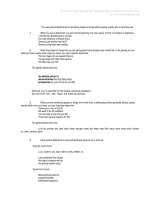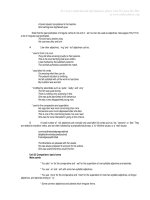Tài liệu Collins cobuild student grammar part 2 docx
Bạn đang xem bản rút gọn của tài liệu. Xem và tải ngay bản đầy đủ của tài liệu tại đây (49.59 KB, 15 trang )
For more material and information, please visit Tai Lieu Du Hoc
at www.tailieuduhoc.org
8 The only negative words that are often used together in the same clause are `neither' and `nor'.
You use `neither' and `nor' together to say that two alternatives are not possible, not likely, or not true.
Neither Margaret nor John was there.
They had neither food nor money.
Unit 13 Count nouns
Main points
* Count nouns have two forms, singular and plural.
* They can be used with numbers.
* Singular count nouns always take a determiner.
* Plural count nouns do not need a determiner.
* Singular count nouns take a singular verb and plural count nouns take a plural verb.
* In English, some things are thought of as individual items that can be counted directly. The nouns which refer
to these countable things are called count nouns. Most nouns in English are count nouns.
See Unit 15 for information on uncount nouns.
1 Count nouns have two forms. The singular form refers to one thing or person.
...a book... ...the teacher.
The plural form refers to more than one thing or person.
...books... ...some teachers.
2 You add `-s' to form the plural of most nouns.
book* booksschool* schools
You add `-es' to nouns ending in `-ss', `-ch', `-s', `-sh', or `-x'.
class* classeswatch* watches
gas* gasesdish* dishes
fox* foxes
Some nouns ending in `-o' add `-s', and some add `-es'.
photo* photos piano* pianos
hero* heroes potato* potatoes
Nouns ending in a consonant and `-y' change to `-ies'.
country* countries lady* ladies
party* parties victory* victories
Nouns ending in a vowel and `-y' add an `-s'.
For more material and information, please visit Tai Lieu Du Hoc
at www.tailieuduhoc.org
boy* boys day* days
key* keys valley* valleys
Some common nouns have irregular plurals.
child* children foot* feet
man* men mouse* mice
tooth* teeth woman* women
WARNING: Some nouns that end in `-s' are uncount nouns, for example `athletics' and `physics'. See Unit 15.
3 Count nouns can be used with numbers.
...one table... ...two cats... ...three hundred pounds.
4 Singular count nouns cannot be used alone, but always take a determiner such as `a', `another', `every', or
`the'.
We've killed a pig.
He was eating another apple.
I parked the car over there.
5 Plural count nouns can be used with or without a determiner. They do not take a determiner when they refer to
things or people in general.
Does the hotel have large rooms?
The film is not suitable for children.
Plural count nouns do take a determiner when they refer precisely to particular things or people.
Our computers are very expensive.
These cakes are delicious.
See Unit 23 for more information on determiners.
6 When a count noun is the subject of a verb, a singular count noun takes a singular verb.
My son likes playing football.
The address on the letter was wrong.
A plural count noun takes a plural verb.
Bigger cars cost more.
I thought more people were coming.
See also Unit 14 on collective nouns.
Unit 14 Singular and plural
Main points
* Singular nouns are used only in the singular, always with a determiner.
* Plural nouns are used only in the plural, some with a determiner.
* Collective nouns can be used with singular or plural verbs.
1 Some nouns are used in particular meanings in the singular with a determiner, like count nouns, but are not
used in the plural with that meaning. They are often called `singular nouns'.
Some of these nouns are normally used with `the' because they refer to things that are unique.
For more material and information, please visit Tai Lieu Du Hoc
at www.tailieuduhoc.org
airdaytimemoonsky
countryendpastsun
countrysidefutureseawind
darkgroundseasideworld
The sun was shining.
I am scared of the dark.
Other singular nouns are normally used with `a' because they refer to things that we usually talk about one at a time.
bathgoridesnooze
chancejogrunstart
drinkmoveshowerwalk
fightrestsmokewash
I went upstairs and had a wash.
Why don't we go outside for a smoke?
2 Some nouns are used in particular meanings in the plural with or without determiners, like count nouns, but are
not used in the singular with that meaning. They are often called `plural nouns'.
His clothes looked terribly dirty.
Troops are being sent in today.
Some of these nouns are always used with determiners.
activitiesfeelingspicturestravels
authoritieslikessights
I went to the pictures with Tina.
You hurt his feelings.
Some are usually used without determiners.
airsgoodsriches
expensesrefreshments
Refreshments are available inside.
They have agreed to pay for travel and expenses.
WARNING: `Police' is a plural noun, but does not end in `-s'.
The police were informed immediately.
3 A small group of plural nouns refer to single items that have two linked parts. They refer to tools that people use
or things that people wear.
binocularsglassestrousers
pincersjeans
pliersknickers
scalespants
scissorspyjamas
shearsshorts
tweezerstights
She was wearing brown trousers.
For more material and information, please visit Tai Lieu Du Hoc
at www.tailieuduhoc.org
These scissors are sharp.
You can use `a pair of' to make it clear you are talking about one item, or a number with `pairs of' when you are talking
about several items.
I was sent out to buy a pair of scissors.
Liza had given me three pairs of jeans.
Note that you also use `a pair of' with words such as `gloves', `shoes', and `socks' that you often talk about in twos.
4 With some nouns that refer to a group of people or things, the same form can be used with singular or plural
verbs, because you can think of the group as a unit or as individuals. Similarly, you can use singular or plural pronouns to refer back
to them. These nouns are often called `collective nouns'.
army, audience, committee, company, crew, data, enemy, family, flock, gang, government, group, herd, media,
navy, press, public, staff, team
Our little group is complete again.
The largest group are the boys.
Our family isn't poor any more.
My family are perfectly normal.
The names of many organizations and sports teams are also collective nouns, but are normally used with plural verbs in
spoken English.
The BBC is showing the programme on Saturday.
The BBC are planning to use the new satellite.
Liverpool is leading 1-0.
Liverpool are attacking again.
Unit 15 Uncount nouns
Main points
* Uncount nouns have only one form, and take a singular verb.
* They are not used with `a', or with numbers.
* Some nouns can be both uncount nouns and count nouns.
1 English speakers think that some things cannot be counted directly. The nouns which refer to these
uncountable things are called uncount nouns. Uncount nouns often refer to:
substances:coal food ice iron rice steel water
human qualities:courage cruelty honesty patience
feelings:anger happiness joy pride relief respect
activities:aid help sleep travel work
abstract ideas:beauty death freedom fun life luck
The donkey needed food and water.
Soon, they lost patience and sent me to Durban.
I was greeted with shouts of joy.
All prices include travel to and from London.
We talked for hours about freedom.
See Unit 13 for information on count nouns.
2 Uncount nouns have only one form. They do not have a plural form.
For more material and information, please visit Tai Lieu Du Hoc
at www.tailieuduhoc.org
I needed help with my homework.
The children had great fun playing with the puppets.
WARNING: Some nouns which are uncount nouns in English have plurals in other languages.
advice, baggage, equipment, furniture, homework, information, knowledge, luggage, machinery, money, news,
traffic
We want to spend more money on roads.
Soldiers carried so much equipment that they were barely able to move.
3 Some uncount nouns end in `-s' and therefore look like plural count nouns. They usually refer to:
subjects of study:mathematics physics
activities:athletics gymnastics
games:cards darts
illnesses:measles mumps
Mathematics is too difficult for me.
Measles is in most cases a harmless illness.
4 When an uncount noun is the subject of a verb, it takes a singular verb.
Electricity is dangerous.
Food was very expensive in those days.
5 Uncount nouns are not used with `a'.
They resent having to pay money to people like me.
My father started work when he was ten.
Uncount nouns are used with `the' when they refer to something that is specified or known.
I am interested in the education of young children.
She buried the money that Hilary had given her.
6 Uncount nouns are not used with numbers. However, you can often refer to a quantity of something which is
expressed by an uncount noun, by using a word like `some'.
See Unit 23.
Please buy some bread when you go to town.
Let me give you some advice.
Some uncount nouns that refer to food or drink can be count nouns when they refer to quantities of the food or drink.
Do you like coffee? (uncount)
We asked for two coffees. (count)
Uncount nouns are often used with expressions such as `a loaf of', `packets of', or `a piece of', to talk about a quantity or
an item. `A bit of' is common in spoken English.
I bought two loaves of bread yesterday.
He gave me a very good piece of advice.
They own a bit of land near Cambridge.
7 Some nouns are uncount nouns when they refer to something in general and count nouns when they refer to a
particular instance of something.
Victory was now assured. (uncount)
For more material and information, please visit Tai Lieu Du Hoc
at www.tailieuduhoc.org
In 1960, the party won a convincing victory. (count)
Unit 16 Personal pronouns
Main points
* You use personal pronouns to refer back to something or someone that has already been mentioned.
* You also use personal pronouns to refer to people and things directly.
* There are two sets of personal pronouns: subject pronouns and object pronouns.
* You can use `you' and `they' to refer to people in general.
1 When something or someone has already been mentioned, you refer to them again by using a pronoun.
John took the book and opened it.
He rang Mary and invited her to dinner.
`Have you been to London ?' - `Yes, it was very crowded.'
My father is fat - he weighs over fifteen stone.
In English, `he' and `she' normally refer to people, occasionally to animals, but very rarely to things.
2 You use a pronoun to refer directly to people or things that are present or are involved in the situation you are
in.
Where shall we meet, Sally?
I do the washing; he does the cooking; we share the washing-up.
Send us a card so we 'll know where you are.
3 There are two sets of personal pronouns, subject pronouns and object pronouns. You use subject pronouns as
the subject of a verb.
Iyouhesheitwethey
Note that `you' is used for the singular and plural form.
We are going there later.
I don't know what to do.
4 You use object pronouns as the direct or indirect object of a verb.
meyouhimheritusthem
Note that `you' is used for the singular and plural form.
The nurse washed me with cold water.
The ball hit her in the face.
John showed him the book.
Can you give me some more cake?
Note that, in modern English, you use object pronouns rather than subject pronouns after the verb `be'.
`Who is it?' - `It's me.'
There was only John, Baz, and me in the room.
You also use object pronouns as the object of a preposition.
We were all sitting in a cafe with him.
Did you give it to them?









